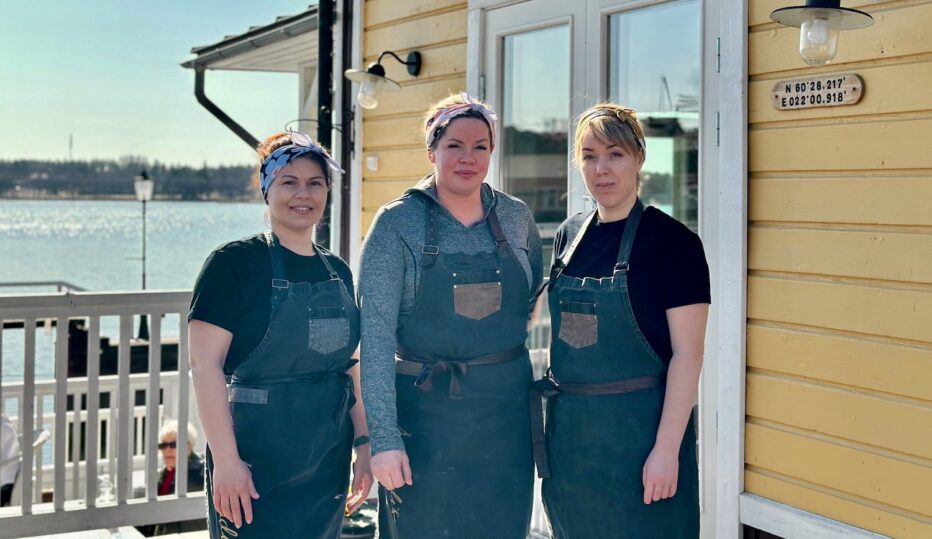
Café owner hires Ukrainians in spite of red tape and language barrier
More than half of the 23 employees in Annika Virtanen’s café are Ukrainian. They are doing excellently in spite of the language barrier. “If I can’t get a Finn to do the job, this is what I do,” Virtanen says.
Annika Virtanen, the owner of the Amandis café in Naantali, employs Ukrainians who have fled the war.
“I have 23 employees, more than half of whom are Ukrainian.”
Virtanen, who runs a small hotel next to her café, says it is hard to get workers for the service industry, and that native Finns do not want to do service jobs.
“In the sectors I represent there is a massive labour shortage, and you can’t find the candidates for the jobs. You can’t do it all by yourself when you run a business, and if I can’t get a Finn to do the job, this is what I do,” Virtanen says.
Virtanen hired her first Ukrainian employee a year ago. Another business owner she knew wanted to help refugees of the war and went to the Ukrainian border to bring two families back to Finland.
“One of them wanted to come work for us. We started with drawing up a written contract for her, which we drafted with the help of Google Translate.”
Because they did not share a language, Virtanen had to show her employee all the routine jobs in the café personally, such as where the rubbish went and how it was sorted. Virtanen’s mother helped her during the orientation.
“That’s where it began, basic orientation. We taught her where all the buildings where, what we do in them, how Finnish washing machines work, and so on.”
The first Ukrainian employee became someone Virtanen could rely on. She actively learned Finnish during the winter, and she recruited the other Ukrainian employees for Amandis.
“Gratitude doesn’t put food on the table”
Virtanen’s Ukrainian employees generally work in the kitchen. Virtanen has created both the recipes and procedures for her café. She had to teach her new employees all about them.
“That doesn’t bother me in itself, because even if I were a Michelin-starred chef, I’d always have to teach someone how to do the work, because I’ve created the whole process myself. If you haven’t been orientated in something, you won’t know how to do it,” she says.
The Ukrainians, like the other employees, do work such as food preparation, making dough, frying and decorating waffles and helping with the washing-up. In the hotel, they help with running the hotel, tending to the garden, and laundry.
Virtanen snorts when asked if the Ukrainians are grateful for the chance to work.
“Gratitude doesn’t put food on the table. I don’t think they need to be grateful to me for anything. Rather, I’m angry on their behalf that they have to do so much work to get employed.”
In the jaws of bureaucracy
Virtanen says that it is very difficult for immigrants in Finland to start work, starting with practicalities such as tax cards and online banking codes. She has helped her own employees in their struggles with bureaucracy.
“If you want to work here, you always need a Finnish-speaker to help you.”
Virtanen says she understands how sudden the war and the arrival of refugees to Finland were a year ago.
“Our society does not have enough structure to start helping them. It’s been particularly difficult to get help from people working in government agencies.”
Virtanen says that service has begun to be provided in Ukrainian, but that there are still situations where help is needed.
“Now my employees have started getting bills for back taxes. They don’t understand the letters because they’re in Finnish.”
Ukrainians continue to face rude service.
“Two weeks ago, the bank made them stand outside because they did not allow everyone in at the same time.”
Virtanen says that it has been made difficult for all jobseekers to find the right employers, not just immigrants.
“I hope that in the future one of the most important tasks of Suomen Yrittäjät will be making unemployment services a lot more flexible,” Virtanen, who is also chair of the Naantalin Yrittäjät local society of Suomen Yrittäjät, the Finnish SME association.
Strong recommendation
The customers of Amandis have received the Ukrainians well.
“A small percentage has said they don’t understand. I’ve been asked whether they are paid wages and so on.”
Virtanen suspects that such questions may be due to a lack of knowledge, which is why she is upfront with her customers.
“It’s nicer for my employees, too, if my customers understand that they don’t speak Finnish that well yet. We also always have someone who speaks Finnish on duty to serve customers.”
Most of the Ukrainian employees, particularly families with children, set their sights on settling in Finland, finding jobs and getting longer residence permits.
“We’ve already gone and opened the first housing deposit savings account for one employee. I know that the core bunch is building a life here.”
Most of them have been studying Finnish all winter. Virtanen says she was surprised that the language barrier is not always that big.
“For example, if there are five of them on shift, suddenly they all understand whole Finnish sentences. They support each other. If one of them doesn’t know what the word parsley means, another of them will.”
Virtanen encourages other business owners in sectors suffering from a labour shortage to take the plunge and employ Ukrainians.
“Even though there are language challenges at the beginning, particularly in a job like this where you have to rely on the work being done well, they are really good workers, whom I can strongly recommend.”
This story was first reported by Turun Sanomat.
Are you already a Suomen Yrittäjät member? Read more about member benefits and advantages!
